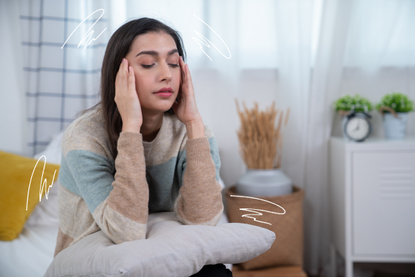Headache causes: The most common reasons, types and treatments
Can't figure out why your head won't stop pounding? These everyday triggers might surprise you...


By definition they're uncomfortable at best and painful at worst, but what causes headaches? If you haven't been up late drinking the night before and have stuck to the recommended 2-litres of water a day, the reason for your headache may not be entirely obvious.
When most people get a headache, they reach for one of the ways to get rid of a headache fast - like dipping into the bathroom cabinet for a couple of Paracetamol. But headaches are one of the most common ailments, coming in 6th in the top 10 reasons why people will miss a day of work or school according to research from the World Health Organisation (WHO). And they can be one of the most serious conditions out there, ranging from mild irritation to severe pain.
"There are more than 150 separate types of headaches recognised by doctors. They fall into two main categories: primary and secondary headaches," explains Dr Bal Athwal, consultant neurologist at the Headache and Facial Pain Clinic at The Wellington Hospital.
Headache causes
There's no general underlying biological headache causes, Dr Athwal explains. "However, there is increasing knowledge of the various biochemical and physiological changes that occur during headache episodes."
Primary headaches are those that come with a trigger, some kind of physical or emotional change to your body. Typical headache causes include:
- Stress and anxiety
- Squinting or other forms of eyestrain
- Sleep disruption or sleep irregularity
- Dehydration
- Missing meals
- Lack of physical activity or sometimes sudden, unaccustomed exercise
While people sometimes also report that smells, noise or bright lights trigger a migraine attack, these headache causes are "probably something they notice when their migraine attack has already started," our expert says. "They are becoming sensitive to lights and noises and smells, rather than these things being the true trigger of the attack."

Migraine headaches, which tend to affect about 1 in 7 people, can be caused by a variety of factors though. These headache causes include: genetics, gender, stress-level and smoking. "Migraines often also run in your family - as many as four out of five people with migraines have a family history. If one parent has a history of migraines, their child has a 50% chance of having them too."
GoodtoKnow Newsletter
Parenting advice, hot topics, best buys and family finance tips delivered straight to your inbox.
About 1 in 3 people who regularly suffer with migraines will also tend to have more issues than others when they've had a bit to drink. According to a 2008 study published in the Journal of Headache Pain, about 10% of sufferers will actively look for ways to prevent a hangover because they've recognised a frequent link between their drinking habits and headaches. When it comes to cluster headaches, the causes often certainly can be situational - like drinking alcohol and eating certain foods (e.g. processed meats) - but the causes are not fully understandable. Either way, despite the many supposed ways to cure a hangover, the best way to avoid an alcohol-related migraine is reducing the amount you drink.
Headaches types
There are more than 150 different types of headache, Dr Athwal explains, but they tend to fall into two main categories: Primary headaches (when there is no separate underlying medical condition causing the headache and secondary headaches (when there is an underlying health condition).
"Primary headaches are by far the most common variety of headache, causing people to seek medical care. They can be recognised by their distinct symptoms, although sometimes the symptoms of these headaches can overlap," they say. Examples of primary headaches include:
- Migraine
- Tension-type headache
- Cluster headache
While secondary headaches often occur because of something else that's going on in the body. "People commonly worry about things like brain tumours, though this is relatively uncommon. There are a number of other conditions where a headache is a primary symptom," our expert says.
"These range from problems with blood vessels, to pressure changes in the spinal fluid, among others. Most people who have a headache for more than three months or so will be found to have a primary headache condition, rather than a serious underlying cause. Though this is not a hard and fast rule."
Migraine
Migraines are not the most common type of headache, according to the National Institute of Health and Clinical Excellence, but they are often of at least moderate intensity and can be severe for some of the 190,000 people in England who experience a migraine attack every day. Or any of the 6 million people who suffer regularly from this type of headache in the UK. While prevalence tends to be 10% of men at the most, women tend to experience migraines more according to the data, with about 25% of women experiencing them.
But what do they actually feel like? Dr Athwal says they're disruptive and are characterised by a throbbing pain, particularly on exertion even when walking around. "The headache may be accompanied by vomiting, and sensitivity to lights and noises," she explains. "People often feel unwell and lose appetite at these times. Migraine episodes usually last hours and sometimes they can last for days."
Tension headache
These are usually mild to moderate in intensity and are by far the most common variety of headache. The World Health Organisation (WHO) reports that as many as 70% of people across different populations will experience a tension headache during any given month. Thought to start in the teenage years and carry on to adulthood, these are also more regularly experienced by women than men - by a ratio of every two men to three women.

"It's experienced as a feeling of tightness and pressure," Dr Athwal explains. "Sufferers often describe a band-like sensation around the head. It's fairly symmetrical, tends not to be throbbing, and tends not to be associated with symptoms like light or sound sensitivity."
Cluster headache
Known to be one of the worst pains you can ever experience, cluster headaches are an "extremely severe form of headache". But luckily, they're not all that common among the general population - affecting about 1 in 1000 people.
"Episodes of cluster headaches are short, usually less than two hours. And they're often reoccurring at very set times. During an attack, an individual tends to be agitated, often paces around and makes noises. They experience swelling, redness, tearing of the eye, stuffiness and a runny nose," our expert explains. "The condition is called a cluster headaches because the episodes tend to cluster in time, often occurring repeatedly for a few days or weeks, then stopping only to come again weeks or months later."
Headache treatments
Naturally, the most effective and appropriate treatments for headaches entirely depend on the diagnosis and the level of symptoms you're experiencing.
For common tension headaches for example, over-the-counter pain relief like aspirin, ibuprofen and acetaminophen - like Tylenol - is the best thing.
If it's just a mild headache caused by stress or anxiousness, for instance, it might be best to try some natural headache remedies to start with. Anything more serious and you'll need to level up your treatment.
For tension-type headaches
"For persistent tension-type headaches," Dr Athwal says, "Prescription medication such as tricyclic antidepressants can suppress headache recurrence. This can be used in combination with alternative therapies aimed at stress reduction." These include:
- Cognitive behavioural therapy
- Biofeedback
- Massage therapy
- Acupuncture
For migraine headaches - standard and chronic
While for migraine headaches, it's best to think about any known triggers - and avoid them. "This usually means taking a regular approach to the daily routine, with regular sleeping times, drinking sufficient amounts of water and not missing meals. Next, we aim to treat individual attacks as effectively as possible when they occur. Thirdly, for those who suffer with frequent episodes we need to think about to prevent them from happening."

For an individual attack, she says, the best treatments include:
- Rest in a quiet, dark room
- Hot or cold compresses to your head or neck
- Over-the-counter medications such as ibuprofen and aspirin.
- Prescription medications including triptans, such as sumatriptan and zolmitriptan
- Anti-sickness medicines such as metoclopramide
However, it's not recommended to use this type of treatment often - no more than about ten times every month. If you feel that you need to use these measures more than that, it might be time to see a doctor. "If migraine episodes are more frequent and interfere with life, you might be subscribed suppressive medicines. Tricyclic antidepressants can be useful here, as can beta-blockers such as propranolol. Further options are anticonvulsants like topiramate."
There's also new medicines being developed to help those suffering with constant headaches. "Recently, monoclonal antibody injections have become available," our expert says. "These are injections once a month, usually administered at home by the patient using a special injection device."
Chronic migraines are slightly different again - and much more severe. Due to their substantial, disabling impact on the individual and potential for long-term negative effects, WHO recognises them as a disability. Unlike normal migraines, chronic migraines are very severe and a persistent form of headache and for these, "we use the tablets already mentioned, antibody injections and also, injections of Botox into the scalp and neck."
For cluster headaches
Cluster headaches typically require a more specialist treatment as they're not treatable with over-the-counter painkillers. There are three main treatments for these, all of which need to be taken as soon as the headache kicks in:
- Sumatriptan injections - up to twice a day.
- Sumatriptan or zolmitriptan nasal spray – which can be useful if you do not want to have injections.
- Oxygen therapy – where you breathe pure oxygen through a face mask.
"These treatments usually relieve the pain of a cluster headache within 15 to 30 minutes," Dr Athwal says. "The patient often has corticosteroids to bring the run of headaches under control. There is also a longer-term treatment to prevent them recurring, which is commonly verapamil tablets."
When should you see a doctor about headaches?
Headache causes need to be taken seriously if the pain is affecting your quality of life, Dr Bal Athwal says. "If you are experiencing severe headaches and are concerned that you might need professional help, you should visit you GP or a specialist clinic - like the Headache and Facial Pain clinic at The Wellington Hospital, part of HCA Heathcare UK - for advice and support as soon as you are able."
If you visit your GP, they may carry out a physical examination. An accurate diagnosis of which headache you're suffering with - and its causes - can also take time as the doctor will need to strike off any possible underlying causes. Be ready to answer questions on:
- Whether the headache is on one side of your head or both
- If there's a pulsating pain or a constant one
- Is the headache severe enough to prevent you from your daily activities?
- Whether the headache is worse or better with physical activity and moving about
- Is the headache accompanied with feeling sick or actually being sick?
- Is the headache accompanied by sensitivity to light and noises?
In an emergency, always dial 999.

Grace Walsh is a health and wellbeing writer, working across the subjects of family, relationships, and LGBT topics, as well as sleep and mental health. A digital journalist with over six years experience as a writer and editor for UK publications, Grace is currently Health Editor for womanandhome.com and has also worked with Cosmopolitan, Red, The i Paper, GoodtoKnow, and more. After graduating from the University of Warwick, she started her career writing about the complexities of sex and relationships, before combining personal hobbies with professional and writing about fitness.
-
 Does your child have a balanced play diet? Research psychologist reveals what this is and why your kid might need one
Does your child have a balanced play diet? Research psychologist reveals what this is and why your kid might need oneIt's not all fun and games - play is a crucial part of childhood....
By Dr Amanda Gummer Published
-
 Scientists say pregnancy can make you age faster - and it could add up to three months to your biological age
Scientists say pregnancy can make you age faster - and it could add up to three months to your biological ageThough the effects might not be as dramatic for older mothers...
By Ellie Hutchings Published